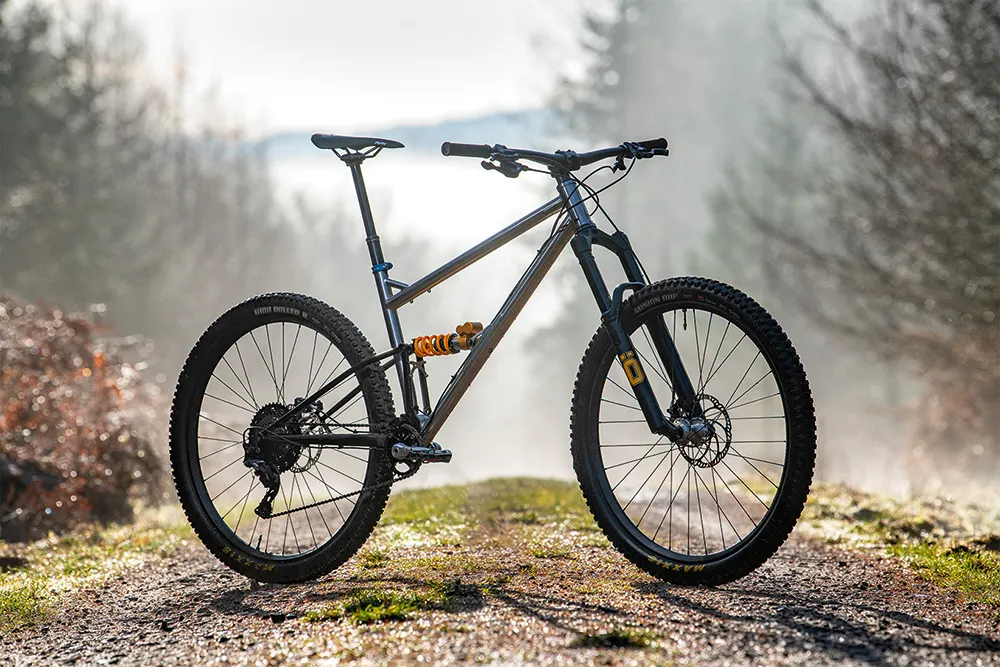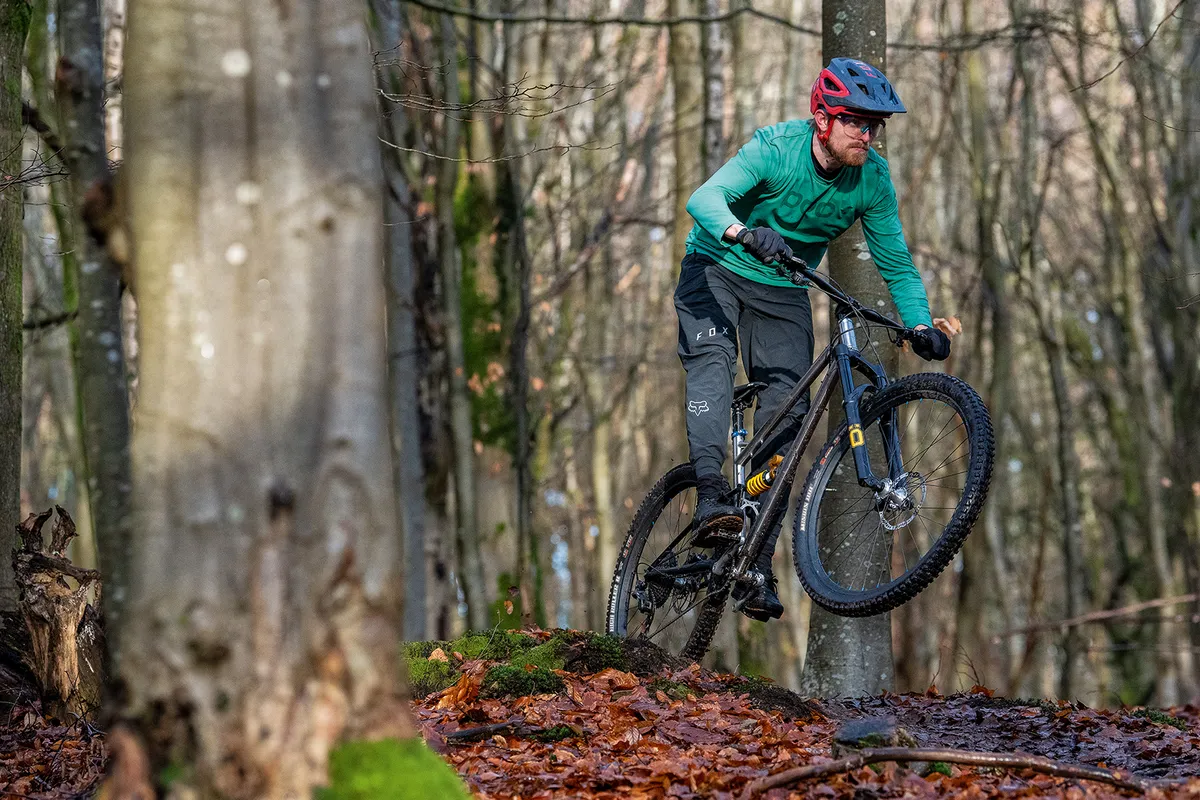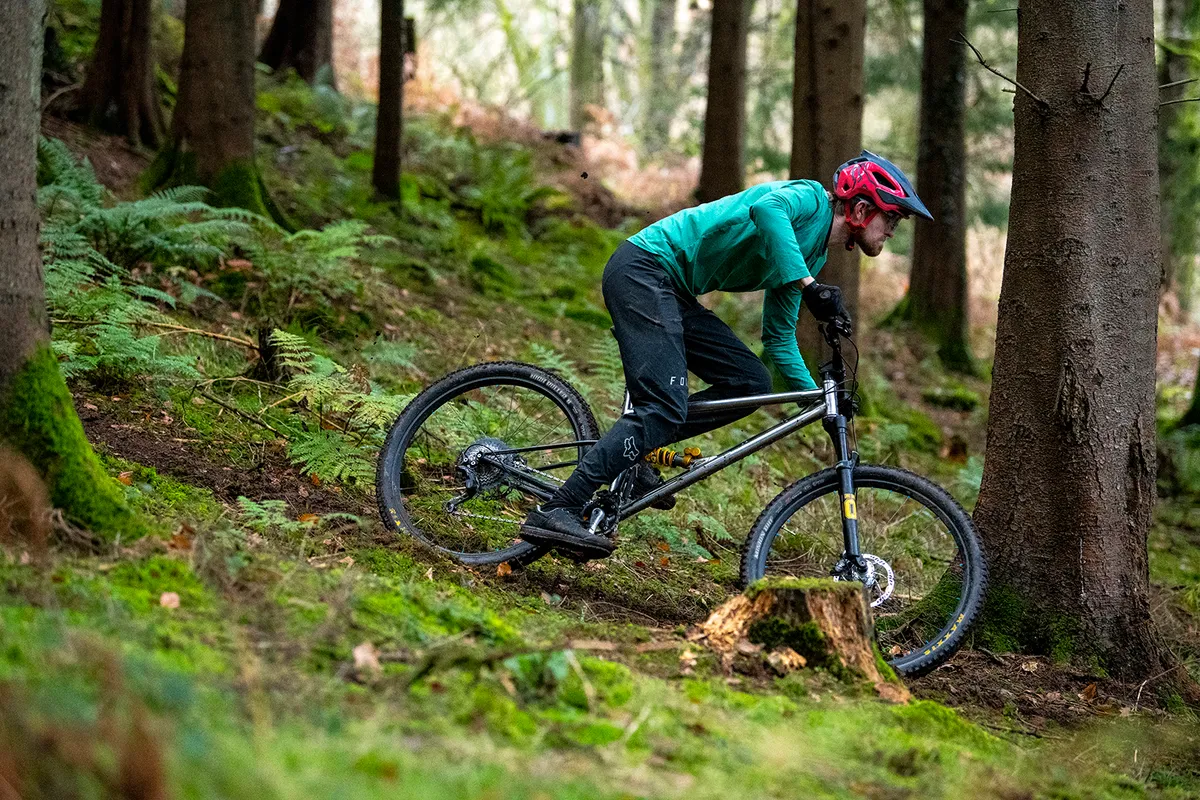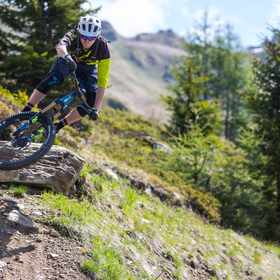The Starling Murmur is one of the most intriguing and niche bikes going. While we’ve tested it before, we never felt the components made the most of what the frame could offer.
This latest version Murmur 29er, with a raw stainless steel frame, tweaked geometry and coil-sprung suspension front and rear, is much closer to unleashing its full potential.
Starling Murmur frame
This Murmur uses a stainless steel front triangle, which allows for a beautiful polished raw finish. It’s made in Taiwan, where Starling founder Joe McEwan tells us they have the skills required to work with the tougher material.
The rear triangle is also made in Taiwan, but from painted regular steel. It’s connected to the mainframe via a single pivot, providing 140mm of linear suspension, where the force builds at a constant rate through the travel.
There’s room for a water bottle under the top tube, plus up to 2.8in tyres in the rear. The axle spacing is Boost 148mm, although apparently you can just bend the steel swingarm inwards to fit 142mm wheels!

Starling Murmur geometry
| | M | L | XL |
|---|---|---|---|
| Seat angle (degrees) | 76.6 | 76.6 | 76.6 |
| Head angle (degrees) | 64.6 | 64.6 | 64.6 |
| Chainstay (cm) | 44.5 | 44.5 | 44.5 |
| Seat tube (cm) | 41 | 44 | 48 |
| Top tube (cm) | 59.6 | 62.8 | 66.3 |
| Head tube (cm) | 11 | 11 | 12 |
| Bottom bracket drop (cm) | 3.5 | 3.5 | 3.5 |
| Wheelbase (mm) | 1,228 | 1,260 | 1,298 |
| Stack (cm) | 63.2 | 63.2 | 64.1 |
| Reach (cm) | 45 | 48.5 | 51.5 |
Starling Murmur kit
McEwan isn’t one for mainstream parts. The Öhlins TTX coil shock works beautifully, but the RXF 36 EVO coil fork is slightly sticky and overdamped. Apparently the suppler M2 version will be available on future bikes.
The wheels are built in Bristol, UK by RyanBuildsWheels. You can choose Hope or Funn hubs, with a choice of DT Swiss rims. McEwan doesn’t offer tyres but supplied my test bike with skinny 2.3in rubber, so I added their RRP to the quoted cost.
These were fitted with CushCore tyre inserts, which weigh 500g per pair, so removing them would take the weight down from 15.6kg to 15.1kg.
Starling Murmur ride impressions
Starling doesn’t have a fleet of pristine press bikes like most brands, so McEwan sent us a well-used demo bike.
The bar was too low, the fork was overdue a service and the shock spring was too soft, so the front wheel skipped more than it gripped.
Once I’d serviced the fork, swapped to a 548lb/in spring (for my 85kg weight) and fitted a higher-rise bar, the bike started to make sense.

Despite weighing 15.6kg, the Murmur isn’t a bad climber. The effective seat-tube angle measures mid-pack at 74.8 degrees, making it harder to attack steep pitches and keep the front wheel under control than on more upright bikes.
But unlike on the Cotic Jeht gold GX, also on test, the suspension doesn’t bob much under power, and it never hangs up on bumps like the Evil Offering GX Hydra, even when pedalling hard.
The coil-sprung shock has more mid-stroke support than air shocks too, so it stays high in its travel, making the seat-tube angle feel a little steeper than it is.
While the 11-speed drivetrain with its 46t biggest sprocket makes stiff climbs harder work than the 12-speed, 52t setups on those other bikes, the suspension does a good job of making them easier. When sprinting hard, the skinny-tubed frame feels surprisingly taut, too, and not like you’re losing any power to flex.
With the stiffer spring and the rebound fully open, the Murmur had an energetic feel on undulating trails, with plenty of predictable mid-travel support and pop.
The higher bar I fitted made it easy to manual and hop over obstacles, and the super-low bottom bracket (333mm) means it’s surprisingly agile when swapping between alternating turns.
While Starling’s website puts the head angle at 64.5 degrees, my bike’s measured around 63 degrees. Head angles often deviate from the claimed figure, but not usually by this much.
However, in the case of this bike, I think it’s a good thing. The steering was floppy in the car park but wonderfully predictable in steep turns and on fast straights. And while the fork struggled with small bumps, it worked brilliantly when sucking up big holes and square-edged hits.

The rear suspension is incredibly supple and predictable. It tracks particularly well when lightly loaded over steep chatter, where it keeps the tyre hugging the ground, but remains composed and supportive when pushing through big compressions.
It’s hard to know whether rear end flex helps with this traction, or if it’s just the suspension. Some damping is added by the CushCore inserts too.
The shock’s large bottom-out bumper kicks in from 65 per cent travel, so there’s no hint of the linkage-free suspension feeling overly linear or bottoming-out easily.
Although the Öhlins fork isn’t the most sensitive (even when fully open), the twin-coil suspension feels well-balanced in compressions, making it easy to push into turns.
The long front centre and slack head angle boost confidence when riding recklessly, but you need to load the bar to make up for the short back end relative to the front centre. That’s alright, though, because the unflappable steering stability, suspension balance and rear wheel grip make it easy (and fun) to lean forward and attack the trail.
How we tested
Small companies have often been at the forefront of innovation in the bike industry. With limited batches, rapid production schedules and rider-rich management, they’re able to ‘think outside the box’ more than the bigger brands.
So if you stray from the mainstream, you might just get a bike that’s ahead of the curve.
For this test we got hold of three trail bikes from boutique brands with 140mm of travel and 29in wheels, all costing between five and six grand.
For that, we’d expect them to leave little to be desired both uphill and down. Two are from UK brands and constructed from steel, while the third is from the USA and made from carbon fibre.
We weighed and measured every detail, then hit the trails, tweaking the setup and suspension, and even swapping a few parts, to optimise ride feel. Once dialled in, we rode them back-to-back on the same test loops that featured steep, technical climbs and gnarly downhills. This shone more light on how each bike performs than months of standalone testing could.
Also on test
- Cotic Jeht gold GX
- Evil Offering GX Hydra
Product
| Brand | starling_cycles |
| Price | 5005.00 GBP |
| Weight | 15.6000, KILOGRAM (XL) - |
Features
| Fork | Öhlins RXF 36 EVO coil, 160mm (6.3in) travel |
| br_stem | Funn, 35mm |
| br_chain | Shimano Deore XT |
| br_frame | Stainless steel mainframe, steel swingarm, 140mm (5.5in) travel |
| Tyres | Maxxis Minion DHF EXO 29x2.3in (f)/Maxxis High Roller 2 EXO 29x2.3in, with CushCore |
| br_brakes | Magura MT Trail, 180mm rotors |
| br_cranks | Middleburn RS8, 170mm, 32t |
| br_saddle | Funn |
| br_wheels | DT Swiss EX 471, 25mm internal width rims on Hope Pro 4 hubs |
| br_headset | Hope H2 |
| br_shifter | Shimano Deore XT |
| br_cassette | Shimano Deore XT, 11-46t |
| br_seatpost | BikeYoke DIVINE, 185mm travel |
| br_gripsTape | Funn |
| br_handlebar | Funn Kingpin, 780mm |
| br_rearShock | Öhlins TTX Coil |
| br_bottomBracket | Shimano threaded |
| br_availableSizes | M, L, XL |
| br_rearDerailleur | Shimano Deore XT (1x11) |
